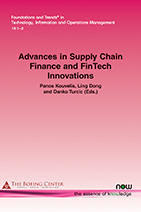Renewable Identification Numbers: A Supply-Chain Risk View
By Hamed Ghoddusi, School of Business, Stevens Institute of Technology, USA, hghoddus@stevens.edu
Abstract
Renewable Identification Number (RIN) is afloor-and-trade mechanism to enforce renewable energy standards in the U.S. transportation fuels market. Motivated by several real-world cases, this chapter offers a stylized dynamic stochastic optimization framework for the price behavior of RIN certificates. We show that RIN price can be formulated as an American spread option on the price of gasoline and ethanol. A closed-form solution is derived for the case of GBM price processes. The solution suggests that the market prefers accumulating RINs in the early periods and using them towards the end of the compliance period. We also discuss potential connections between the dynamics of the RINs market and firms’ operational decisions.
Emerging Advances in Supply Chain Finance and FinTech Innovations
Advances in Supply Chain Finance and FinTech Innovations examines three themes:
Financing Issues in Supply Chains look into popular working capital management financing practices: trade credits and guarantor practices including advanced trade credit practices in supply chains, guarantor financing practices for capital constrained retailers, and innovative practices of joint financing of capital constrained firms by a bank.
FinTech Innovations for Supply Chains examines business model innovations for supply chain financing supported through new platform technologies (such as blockchain), and simple financial technologies effectively implemented for high impact in supply chain risk management.
Advances in Risk Management of Operational Systems provide state-of-the art thinking on many risk issues in supply chain operations including disruption strategies over the product life cycle, the production planning complexities for a capital constrained manufacturer that uses Inventory Based Financing (IBF) scheme to fund its working capital needs, capacity procurement decision, capacity planning in the presence of demand and price uncertainty, and valuing complex real options in dynamic operational settings.

Companion
Foundations and Trends® in Technology, Information and Operations Management, Volume 14, Issue 1-2 Special Issue: Advances in Supply Chain Finance and FinTech Innovations
See the other articles that are also part of this special issue.